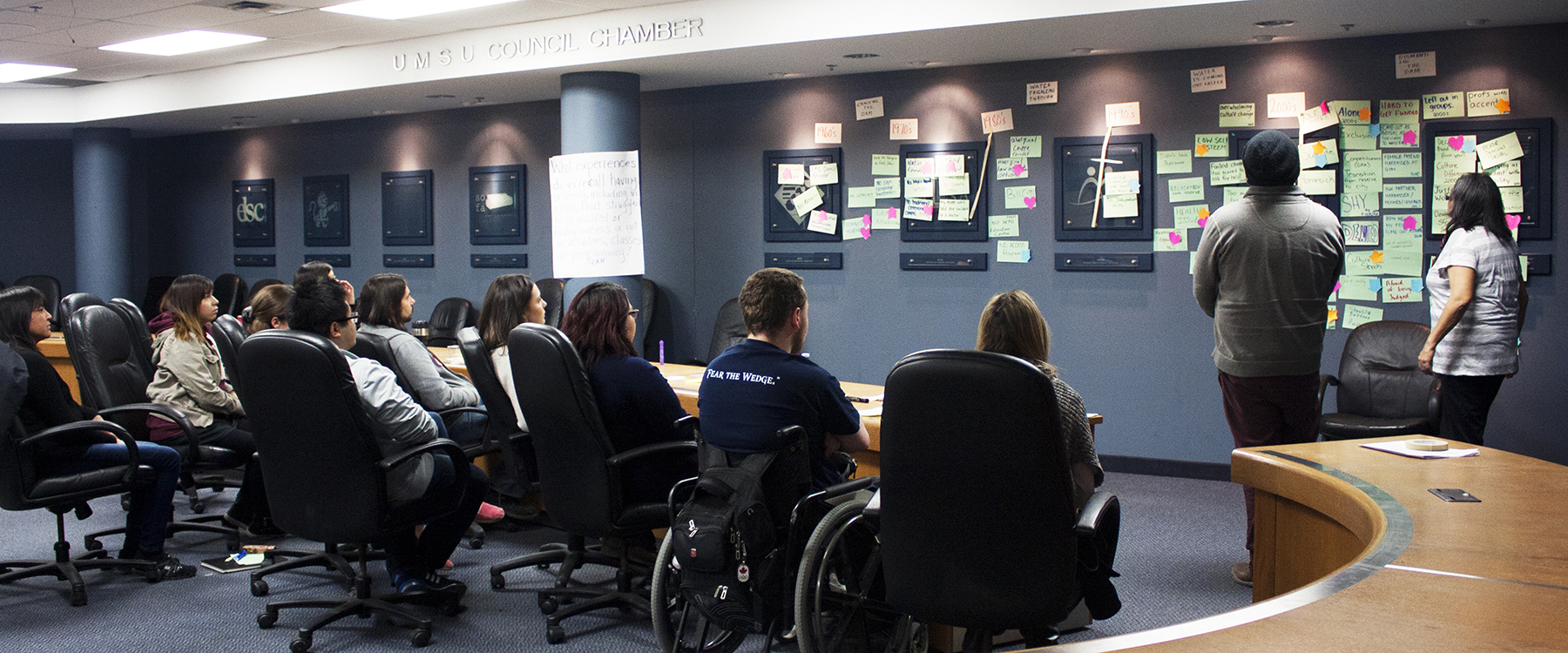Following Nancy Macdonald’s Jan. 22, 2015 Maclean’s article denouncing Winnipeg as “where Canada’s racism problem is at its worst,” there was much uproar around the city. Winnipeggers began sharing and responding to Macdonald’s article, and online social platforms were ignited with debates on local racism.
Wabishkigaabo (Will Landon), Aboriginal students’ representative for the University of Manitoba Students’ Union (UMSU), utilized this renewed dialogue to kickstart a series of workshops targeting racial oppression on the University of Manitoba campus, hoping to facilitate constructive discourse between indigenous and non-indigenous students. The workshops were held at both UMSU Council chambers and elsewhere on campus.
Wabishkigaabo, as well as his mother, Ogimaa’anangook (Eleanor Skead), and father, Keganoodin (Bert Landon), all going by their indigenous spirit names, facilitated workshops from March 17-20, running from 10 a.m. to 2 p.m. each day.
Each workshop began with a song with the spiritual purpose of looking for life, performed by Keganoodin. This was followed by a series of activities led by Wabishkigaabo and Ogimaa’anangook, such as a historical scan which mapped students’ personal experiences on campus within a timeline.
Using their personal experiences as a point of departure, participants were able to identify larger societal patterns and collective issues on campus.
Following this exercise, participants focused on individual events to formulate possible solutions or strategies to ensure that students’ negative campus experiences do not repeat themselves, and are addressed ethically and appropriately, if and when they do.
Keganoodin concluded every workshop with the traditional indigenous song, “The Travelling Song.”
Central to Wabishkigaabo’s approach in facilitating student awareness around concepts of privilege and oppression was highlighting the difference between “equality” and “equity,” particularly given that educational institutions often assume that students begin their studies on a level playing field, Wabishkigaabo said.
“Equality means that everyone gets the same tools in order to succeed, but this assumes that everyone starts off at the same level,” Wabishkigaabo said. “Equity means that people who are disadvantaged get the resources they need in order to succeed.”
Wabishkigaabo told the Manitoban that this standardized approach to education that he criticizes is particularly harmful to indigenous students attending the university given that many, including Wabishkigaabo himself, are transitioning from living on reserves to living on campus.
“The university is almost like a new residential school,” Wabishkigaabo said. “A lot of indigenous students have to live in dorms and go to classes, and these are Western classes.”
During these workshops, one of the biggest themes that emerged was a collective lack of safety, whether physical, psychological, or emotional.
“Aboriginal students don’t feel safe with their identity, women are being harassed at the gym, and people are being mugged on campus grounds,” Wabishkigaabo said.
The issue of identity loss amongst indigenous students resurfaced over the course of these workshops.
“I have to colonize myself within this institution,” Wabishkigaabo explained.
“To succeed, I have to think like the colonizers in order to get my bachelor degree, in order to get my master’s, my doctorate, whatever I need that’s going to value my knowledge in a Western-dominated world.”
Wabishkigaabo added that, although native studies courses are offered at the university, these courses often conform to colonialist structures and hierarchies of knowledge which systemically devalue indigenous experience.
“I have so much lived experience, so much knowledge from my elders, but since they are not PhD people who have some other dude who agrees with what they’re saying [ . . . ] their knowledge isn’t considered valuable,” he said.
According to Wabishkigaabo, facilitating these kinds of workshops engages students on a much more meaningful level than simply inviting a speaker to give a presentation to students.
“It would have just been someone telling us students how to do it,” he said, “when the students themselves already know how to do those things.”
Data from these workshops will be collected and compiled into a multimedia report to be submitted to the administration, student leaders, and “whoever would get the most use out of the information,” Wabishkigaabo said.
“The best-case scenario would be to get recommendations, present these to the deans, the presidents, and faculty members [in order to] start creating change in the university,” he said.
The data is currently awaiting review from a working group in order to be submitted to university officials.
Wabishkigaabo—who planned and facilitated these workshops free of charge, and also provided a meal to participants—urges students to continue exchanging ideas on their own time.
“You don’t need to be sitting in a seat of power or a representation role in order to do these things,” Wabishkigaabo said. “You just need to have the drive to want to make some sort of change.”


